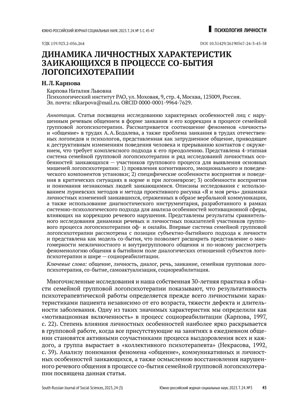Abstract
This article examines the characteristics of individuals with speech communication disorders, specifically stuttering, and explores the use of Family Group Speech Therapy as a corrective tool. The paper analyzes the correlation between the concepts of ‘personality’ and ‘communication’ in the works of A. A. Bodalev. It also discusses the issue of stuttering as presented by Russian speech therapists and psychologists. Stuttering is viewed as a communication difficulty that can lead to destructive changes in human behavior and hinder social interactions. Therefore, a comprehensive approach is necessary to overcome it. The study presents a 4‑stage system of family group logo-psychotherapy and several studies on the personal characteristics of stutterers who participate in the group process to identify the main targets of logo-psychotherapy. The targets include: 1) the cognitive, emotional, and behavioral components of attitude; 2) specific features of perception and behavior in critical situations in norm and in logo-neurosis; and 3) features of perception and understanding of strangers by stutterers. The article describes the use of Lurian methods and the method of projective drawing ‘I and my speech’ to analyze the dynamics of personal changes of stutterers in relation to verbal communication. Additionally, diagnostic tools developed within the framework of the system-psychological approach are used to analyze the motivational sphere affecting the correction of the speech disorder. The study presents a comparison of speech and personality dynamics in participants undergoing group speech psychotherapy, both in-person and online.
Keywords
References
- Bodalev, A.A. (1983). Lichnost’ i obshcheniye. Izbrannyye Trudy [Personality and Communication. Selected Works]. M.: Pedagogika [M.: Pedagogy].
- Bodalev, A.A. (1996). Psikhologiya obshcheniya [Psychology of Communication]. M.: “Institut prakticheskoy psikhologii”, Voronezh: NPO “MODEK”
- Bodalev, A.A. (2016). Put’ k psikhologii i zhizn’ v psikhologii. [The Path to Psychology and Life in Psychology]. Psikhologiya obshcheniya: Shkola akademika A. A. Bodaleva. Kollektivnaya monografiya [Psychology of communication: The School of academician A. A. Bodalev] (pp. 297–316). M.: Assotsiatsiya shkolnykh bibliotekarey russkogo mira (RSHBA).
- Bodalev, A.A., Karpova, N.L. (2012). Rol’ obshcheniya v formirovanii i sotsioreabilitatsii lichnosti [The Role of Communication in the Formation and Social Rehabilitation of an Individual]. Vek psikhologii. K 100-letiyu Psikhologicheskogo instituta RAO [The Age of Psychology. On the 100th Anniversary of the Psychological Institute of the Russian Academy of Sciences] (pp. 722–733). SPb.: Nestor-Istoriya.
- Bodalev, A.A., Karpova, N.L., Labunskaya, V.A. (2015). Obshchenie: ponyatiynyy analiz [Communication: Conceptual Analysis]. Psikhologiya obshcheniya. Entsiklopedicheskiy slovar’ [Psychology of Communication. The Encyclopedic Dictionary] (pp. 85–86). M.: Kogito-tsentr.
- Glozman, Zh.M. (2017). Psikhologiya. Obshcheniye i zdorovye lichnosti [Psychology. Communication and Personal Health]. M.: Yurayt [M.: Yurait].
- Glozman, Zh.M., Karpova, N.L., Cheburashkin-Antipov, D.N. (2018). Dinamika narusheniy lichnosti i plavnosti rechi v khode logopsikhoterapii zaikaniya [Dynamics of Personality Changes and Verbal Fluency of Persons Who Stutter After Logopsychotherapy]. Defektologiya Defectology], 5, 51–57.
- Glozman, Zh.M., Nikolayeva, Ye.I., Karpova, N.L., Dobrin, A.V. (2022). Rol’ funktsionalnoy asimmetrii v razvitii i dinamike kognitivnykh i rechevykh rasstroystv [The Role of Functional Asymmetry in the Development and Dynamics of Cognitive and Speech Disorders]. M.: PI RAO.
- Karpova, N.L. (1997). Osnovy lichnostno-napravlennoy logopsikhoterapii [Fundamentals of Person-Centered Logo-psychotherapy]. M.: MPSI-Flinta.
- Karpova, N.L. (Ed.) (2011). Semeynaya gruppovaya logopsikhoterapiya: issledovaniye zaikaniya [Family Group Speech Therapy: A Study of Stuttering]. SPb.: Nestor-Istoriya.
- Karpova, N.L. Nikolayeva, Ye.I. (2020). Semeynyye faktory, povyshayushchiye veroyatnosti vozniknoveniya zaikaniya u rebenka (obzor zarubezhnykh issledovaniy) [Family Factors Increasing the Probability of Appearance of Stuttering in a Child (Review of Foreign Studies)]. Defektologiya [Defectology], 3, 41–50.
- Karpova, N.L., Ryzhov, B.N. (2022). Dva effekta semeynoy gruppovoy logopsikhoterapii pri reabilitatsii lits s zaikaniyem [Two Effects of Family Group Speech Therapy in the Rehabilitation of Persons with Stuttering]. Sistemnaya psikhologiya i sotsiologiya [Systems Psychology and Sociology], 4(44), 68–80. DOI: 10.25688/2223-6872.2022.44.4.06
- Kukosyan, A.G., Ryabikina, Z.I. (2015). Issledovanie obshcheniya v Kubanskom gosudarstvennom universitete [Kuban State University Communication Studies]. In Psikhologiya obshcheniya. Entsiklopedicheskiy slovar’ [Psychology of Communication. The Encyclopedic Dictionary]. M.: Kogito-tsentr.
- Labunskaya, V.A. (2015). Sub’’ekt zatrudnennogo i nezatrudnennogo obshcheniya. Kontseptsiya V. A. Labunskoy [The Subject of Difficult and Uncomplicated Communication. The Concept of V. A. Labunskaya]. Psikhologiya obshcheniya. Entsiklopedicheskiy slovar’ [Psychology of Communication. The Encyclopedic Dictionary], 56–57. M.: Kogito-tsentr.
- Leontyev, A.A. (1997). Psikhologiya obshcheniya [Psychology of Communication]. M.: Smysl.
- Nekrasova, Yu.B. (1992). Psikhologicheskie osnovy protsessa sotsioreabilitatsii zaikayushchikhsya [Psychological Foundations of the Process of Social Rehabilitation of Stuttering]. Moskva.
- Nekrasova, Yu.B. (2006). Lecheniye tvorchestvom [Creative Treatment]. M.: Smysl.
- Ryabikina, Z.I., Tanasov, G.G. (2010). Sub’’ektno-bytiynyy podkhod k lichnosti i analizu yeye so-bytiya s drugimi (konstruktivnaya versiya postmodernistskikh “Nastroeniy”) [The Subject-Being Approach to Personality and the Analysis of its Co-Existence with Others (A Constructive Version of Postmodern “Moods”)]. Chelovek. Soobshchestvo. Upravlenie [Human. Community. Management], 2, 4–19.
- Vygotskiy, L.S. (1983). Sobraniye sochineniy [Collected Works]. M.: Pedagogika.
 Русский
Русский


